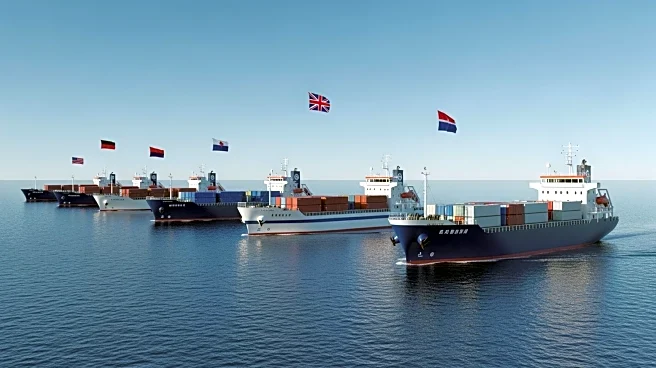What's Happening?
Maersk has reflagged two containerships into the Indian register, following the lead of CMA CGM, as part of its strategic investment in India's growing economy. This move aligns with Maersk's earlier announcement
to invest up to $5 billion in India, focusing on logistics and inland operations. The reflagging is part of a broader initiative by the Indian government to expand its domestic shipping and shipbuilding industries. Changes to cabotage regulations and financial programs are being introduced to make India a more attractive location for ship registration. The Maersk Vilnius and Maersk Vigo, previously registered in Singapore, are now part of India's registry, with plans for repairs at Cochin Shipyard, despite current capacity constraints.
Why It's Important?
The reflagging of ships by major carriers like Maersk and CMA CGM signifies a shift in the global shipping industry, with India emerging as a key player. This development is crucial for India's economy, as it aims to increase the percentage of exports transported on Indian-flagged ships from the current 5-7% to 40%. The move is expected to boost employment, as Indian regulations require Indian crews, with CMA CGM already hiring over 1,000 Indian seafarers. The initiative also addresses the significant annual expenditure of $75 billion on foreign shipping, potentially reducing costs and enhancing domestic capabilities.
What's Next?
As India Maritime Week approaches, further announcements are anticipated, including potential reflagging by MSC Mediterranean Shipping. The Indian government continues to push for increased domestic shipping capacity, with the Shipping Corporation of India seeking to purchase secondhand vessels. The expansion of Cochin Shipyard's capacity is crucial for accommodating larger ships and fulfilling repair assignments. The ongoing developments are expected to attract more international carriers to register ships in India, further strengthening the country's shipping industry.
Beyond the Headlines
The reflagging trend highlights the strategic importance of India in global shipping, potentially leading to long-term shifts in trade routes and logistics operations. The emphasis on domestic shipping could foster technological advancements and infrastructure development within India, enhancing its competitiveness in the global market. Additionally, the focus on employing Indian crews may have cultural and social implications, promoting maritime careers and skills development among the local workforce.









